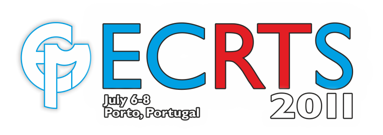OSPERT 2011
7th annual workshop on
Operating Systems Platforms for Embedded Real-Time applications
July, 5th 2011, Porto, Portugalheld in conjunction with

Important Dates:
Apr 24, 2011:
Submission Deadline
May 18, 2011:
Acceptance Notification
June 18, 2011:
Submission of camera-ready papers
July 5, 2011:
Workshop
Workshop Chairs:
Gabriel Parmer
George
Washgington University, USA
Thomas Gleixner
Linutronix,
Germany
Program Committee:
Carsten Emde
Open Source Automation Development Lab, Germany
Peter Zijlstra
Red Hat Linux, Netherlands
Jim Anderson
University of North Carolina, USA
Rodolfo Pellizzoni
University of Waterloo, Cananda
Scott Brandt
University of California, Santa Cruz, USA
Kevin Elphinstone
University of New South Wales/NICTA, Australia
Neil Audsley
University of York, UK
Hermann Härtig
TU Dresden, Germany
Stefan Petters
Instituto Superior de Engenharia do Porto, Portugal
Proceedings (pdf)
Program
| Tuesday, July 5th 2011 | |
| 8:30-9:00 | Registration |
| 9:00-10:30 |
Keynote Talk by Gernot Heiser: Towards an OS platform for truly dependable real-time systems |
| 10:30-11:00 | Coffee Break |
| 11:00-12:30 | Session 1: Parallelism in Real-Time
Systems
|
| 12:30-13:30 | Lunch |
| 13:45-15:30 | Panel Discussion: The present and
future of parallelism in real-time
|
| 15:30-16:00 | Coffee Break |
| 16:00-18:00 | Session 2: Abstraction in Real-Time
Systems
|
| 18:00-18:30 | Discussion and Closing Thoughts |
Call for papers (txt)
Research on innovative RTOS architectures and services is a hot topic. Developers of Real-Time Operating Systems (RTOS) are faced with many challenges arising from two opposite needs: extreme optimization of resource usage (processor, energy, network bandwidth, etc.) vs. dynamic configuration and upgrading, flexible scheduling, component-based development and deployment, etc. While real-time systems continue to be used in many small embedded applications, real-time services are being introduced and used in general- purpose operating systems. Notable examples are the various flavors Linux that provide support to time-sensitive applications.
This workshop is intended as a forum for researchers and practitioners of RTOS to discuss the recent advances in RTOS technology and the challenges that lie ahead. The workshop will consist of submitted papers as well as invited presentations about academic state-of-the-art and industrial state-of-practice within the area.
Upon acceptance, a complete version of the paper (max 10 pages) must be prepared and submitted. All papers will be made available to all participants a week before the workshop so that contributions can be examined prior to the workshop.
Scope
Topics include but are not limited to:
- Dynamic reconfiguration and upgrading
- Support for component based development
- Scalability, from very small scale embedded systems to full-fledged OSes
- Flexible scheduling
- Quality of Service guarantees
- Real-Time on Linux
- Interaction with reconfigurable hardware
- Support for embedded multiprocessor architectures
- Coordinated management of multiple resources
- Security and fault tolerance for embedded real-time systems
- Power-aware operating systems
Submission of Papers
Submitted papers should follow the IEEE conference format (2 columns, 10 pt, single-line spacing) and should not exceed 10 pages in length. Papers may be submitted in either PDF or Postscript format. The papers will be reviewed by the workshop Program Committee. All accepted papers will be made available to all participants one week before the workshop so that contributions can be examined prior to the event.
We want to encourage scientific reproducibility, and discourage redundant work within the community. Thus, code relevant to each submission must be publicly available, and a link to it included in the submission. If you require an exception, please contact the chairs. If your submission does not include an implementation, there are no such restrictions.
Papers should be submitted by using the START Conference Manager system. The system acknowledges receipt of each submission by sending an e-mail to the contact author, and it allows to revise a submission till the deadline.
If a paper is accepted, at least one author should register for the workshop following indications sent in the notification of acceptance, and present the paper at the workshop in person.
In order to submit a paper, visit the submission page.